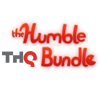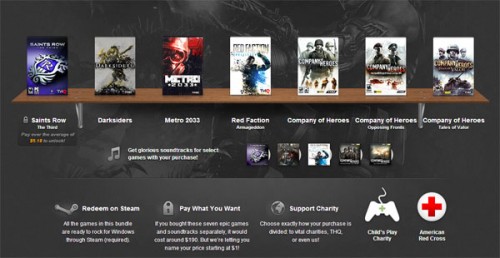- Qualcomm Launches Snapdragon 4 Gen 2 Mobile Platform
- AMD Launches Ryzen PRO 7000 Series Mobile & Desktop Platform
- Intel Launches Sleek Single-Slot Arc Pro A60 Workstation Graphics Card
- NVIDIA Announces Latest Ada Lovelace Additions: GeForce RTX 4060 Ti & RTX 4060
- Maxon Redshift With AMD Radeon GPU Rendering Support Now Available
Humble Bundle and THQ Shake Hands, Many Heads

When Humble Bundle announced a promotion featuring THQ’s games last week, what resulted was on par with a digital atom bomb. Long-time fans of the service felt betrayed, disgusted by the fact that the people behind it would go against their core values for a profit. But before we get too hasty, let’s look at things from a couple of different angles.
Page 1 – Introduction, The Bumbling
When the original Humble Bundle was released in early 2010, it was as if gamers’ prayers had finally been answered. Up to that point, Valve’s Steam platform was the best source for scoring great games on the cheap thanks to its regular sales, but here we had a new service that didn’t just aim to sell good games for cheap, but promote good ethics and the independent developer.
Since its inception, there have been a couple of specific qualities about Humble Bundle that have helped set itself apart from the pack. At the forefront has been its insistence on selling DRM-free content. After purchasing, you’re given a URL to download a no-nonsense installer. No phoning home. No complex serial codes. No need to send a sample of your DNA to the publisher. Much like GOG.com, the folks at Humble Bundle realize that serving DRM-free software to paying customers is a sign of respect.
Humble Bundle has also done well to promote cross-platform gaming. At the time of the first Bundle’s launch, Valve had just released its Steam client for Mac – which was effectively a punch to the gut of Linux users everywhere. With Humble Bundle, however, Linux users stood proud and consistently spent more than the average. They finally had a platform to prove that they want games for their OS of choice – and some have attributed this movement to Valve’s recent interest boost in the OS.
DRM-free and cross-platforming would seal the deal for a lot of people, but taking things one-step further, Humble Bundle allowed gamers to pay what they felt the games were worth, or at least what they could afford. This has bode well as we’ve regularly seen select Bundles reach $1m in revenue – and sometimes, much more. The current leader is Humble Bundle V, which featured games such as Bastion, Amnesia and Limbo. In all, that Bundle sold nearly 600,000 copies, resulting in sales of $5.10 million.
Oh – and let’s not forget the Humble Bundle’s focus on generating funds for charity. Charity, DRM-free content, cross-platform, a focus on indie developers and a pay-what-you-want pricing scheme – what could possibly make Humble Bundle better? That’s a hard one to answer. What could ruin a Humble Bundle? This one’s easier.
For the two-and-a-half years that Humble Bundle has existed, it’s become expected that the folks there would stick to the ethos laid out in the early days. Few would have expected that it’d become not-so-humble and jump into bed with major developer – much less go against most of the other rules that have been in place for so long. With the release of the “Humble THQ Bundle” last week, it became clear to both the folks at Humble Bundle itself, and the world over, just how seriously some people have appreciated the service because of its core values.

The official blog post promoting the bundle was immediately inundated with unhappy fans. Here area few select comments that illustrate the situation well:
“I am so disappointed. This is not indie. It’s not multiplatform. It’s DRM.“
“By doing this the Humble Bundle has become just another “cheap deals” platform for games.“
“I have bought every bundle so far, based on the fact that it supported Linux, was DRM-free and it supported indie developers.“
“Why, Humble, why? Going back on your core values.“
Were the people behind Humble Bundle really that ignorant to not realize that this move would garner this sort of reaction? I’ll be honest – I didn’t expect it. While I appreciated the core values that the Humble Bundle stuck to, I saw other pluses with this bundle that helped level things out.
I don’t expect many people to agree with me, but I’d like to lay out the pros and cons that I’ve thought about over the past couple of days and see if this really is as bad as it’s been made out to be.
The Bumbling
If you can remember as far back as the second, third and fourth paragraphs that helped kick off this article, simply inverse them. You’ll now be able to see why some people are so up in arms with the latest bundle. THQ’s Bundle isn’t DRM-free, isn’t cross-platform and certainly isn’t indie. The factors that have carried over include the donations to charity and the pay-what-you-want pricing scheme.
With this Bundle, a couple of major values that the folks behind it have stuck to all this time have been gone against. As has been made clear by many comment sections around the Web, including our own, people took the focus on indie and the DRM-free and cross-platform nature of the games (and other content) to heart. To some, this move felt like a back-stabbing. Many have been faithful all this time, supporting each and every Bundle – because it’s been a great way to stand up for what they believe in and it’s what they want to help promote. But many now feel that the people behind the Humble Bundle just can’t be trusted.
So what’s this all mean? Are those who have remained faithful to the service all this time suddenly going to stop supporting it? It’s hard to say. I have seen many people state it, however, as the main reason they’ve supported it up to this point has been to support its core values and the promotion of indie games.
A bigger question is whether or not the people behind Humble Bundle will truly care. At the forefront, they’re running a business, and to go against an idea that’s a sure-fire way to increase revenue isn’t something we see all too often. At the time of writing, THQ’s Bundle has been live for six days. In this time it’s sold more units than any other promotion (622,000), and its $3.5 million revenue isn’t too paltry either. It still has a ways to go to reach the $5.1 million record1 of Humble Bundle V, but there are still 7 days to go.
I can sympathize with those who put their money where their mouths are for these Bundles. Supporting a good cause and then being played for a fool is never a good thing, mentally or emotionally. In Humble Bundle’s defense, I don’t believe it ever stated with certainty that it’d only ever be adhering to those values I laid out in the first few paragraphs. In that way, this move may not be so surprising after all. This is business.
I will say, however, that there was another comment made to the Humble Bundle blog that I’m having a hard time disagreeing with.
“THQ is welcome to make its own Bundle for those purposes. This dilutes the Humble Bundle down to zero.“
THQ is a major game publisher, and with the excitement that’s always generated around a Humble Bundle, Steam sale or anything similar, you wouldn’t imagine that it would have been too difficult for the company to implement its own pay-what-you-want Bundle. Sure, people would have still compared it to the Humble Bundle, but it wouldn’t have been associated with it. Humble Bundle devouts would have had no mood change, and the people behind the service wouldn’t have had to stomach so much flak. There’s no way I believe that THQ wouldn’t have had a seriously popular promotion if it decided to do one on its own.
1 – Wikipedia
Support our efforts! With ad revenue at an all-time low for written websites, we're relying more than ever on reader support to help us continue putting so much effort into this type of content. You can support us by becoming a Patron, or by using our Amazon shopping affiliate links listed through our articles. Thanks for your support!





